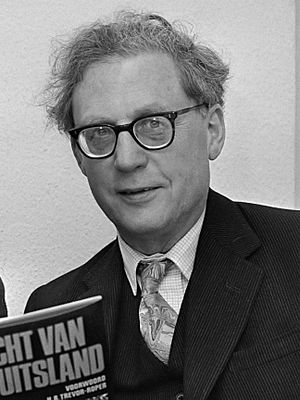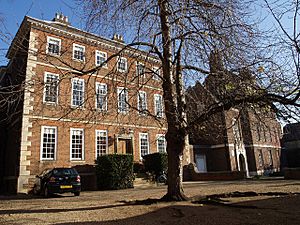Hugh Trevor-Roper facts for kids
Quick facts for kids
The Lord Dacre of Glanton
|
|
|---|---|

Trevor-Roper in 1975
|
|
| Born |
Hugh Redwald Trevor-Roper
15 January 1914 Glanton, Northumberland, England
|
| Died | 26 January 2003 (aged 89) Oxford, Oxfordshire, England
|
| Alma mater | Christ Church, Oxford |
| Occupation | Historian |
| Known for | Studies in 17th-century European history |
| Title | Regius Professor of Modern History |
| Term | 1957–1980 |
| Predecessor | Vivian Hunter Galbraith |
| Successor | Michael Howard |
| Spouse(s) |
Alexandra Howard-Johnston
(m. 1954; died 1997) |
| Military career | |
| Allegiance | |
| Service/ |
|
| Rank | Major |
| Unit | Intelligence Corps |
| Battles/wars | World War II |
Hugh Redwald Trevor-Roper, Baron Dacre of Glanton (born 15 January 1914 – died 26 January 2003) was a famous English historian. He was a professor of Modern History at the University of Oxford.
Trevor-Roper wrote many essays and articles about history. He focused on England in the 1500s and 1600s, and also on Nazi Germany. Many people believe his short essays changed how we think about the past. Some of his writings were very long, but they always got to the main point of big topics.
His most popular book was The Last Days of Hitler (1947). He wrote it after being asked to find out what happened to Adolf Hitler in 1945. He interviewed many people and studied documents to show that Hitler had died. He also showed that Hitler's rule was not as organized as some thought.
However, Trevor-Roper's reputation was hurt in 1983. He said that some papers, known as the Hitler Diaries, were real. Later, it was proven that these diaries were fake.
Contents
Early Life and Education
Hugh Trevor-Roper was born in Glanton, England. His father was a doctor. Hugh had a brother named Patrick Trevor-Roper, who became a leading eye surgeon and an activist for fairness.
Hugh went to Belhaven Hill School and Charterhouse School. He then studied at Christ Church, Oxford. He first studied Classics, which is about ancient Greek and Roman history and languages. Later, he switched to Modern History.
He was very good at his studies. He won several scholarships for Classics. His first book, published in 1940, was about Archbishop William Laud. In this book, he shared new ideas about Laud.
Military Service in World War II
During World War II, Trevor-Roper worked as an officer in the British Secret Intelligence Service. He helped to intercept messages from the German intelligence service, called the Abwehr.
In 1940, he helped to decode some of these messages. This showed how important this work was and led to more efforts at Bletchley Park to decode German communications. The information from these messages helped in many important operations during the war.
Investigating Hitler's Last Days
In November 1945, Trevor-Roper was asked to find out what happened to Adolf Hitler. There were rumors that Hitler was still alive. Trevor-Roper's job was to prove that Hitler had died.
He used the name "Major Oughton" for his investigation. He interviewed many people who had been with Hitler in his bunker. He also looked at documents that survived.
Trevor-Roper quickly wrote a report, which became his famous book, The Last Days of Hitler. The book describes the last ten days of Hitler's life. It also tells what happened to some of the important people around Hitler.
He wrote the book in a dramatic and witty way. It was published in 1947 and became very popular.
Master of Peterhouse College
In 1980, when he was 67, Trevor-Roper became the Master of Peterhouse. This is the oldest college at the University of Cambridge. Some people thought he would be very traditional and against new ideas.
However, Trevor-Roper often disagreed with those who elected him. He started many changes at the college. For example, he pushed for women to be allowed to study at Peterhouse, which happened in 1983. He left Peterhouse in 1987.
Later Life and Legacy
On 4 October 1954, Trevor-Roper married Lady Alexandra Henrietta Louisa Howard-Johnston. She was the daughter of Earl Haig. They did not have any children together.
In 1979, he was given the title Baron Dacre of Glanton. This meant he became a life peer and could sit in the House of Lords.
In his later years, Trevor-Roper had trouble with his eyesight. But he had surgery and used a special machine to help him read and write. He continued to write articles, even at 88 years old.
Hugh Trevor-Roper died on 26 January 2003, at the age of 89.
Books Published After His Death
Several of Trevor-Roper's books were published after he passed away.
- Letters from Oxford (2006) is a collection of letters he wrote to his friend Bernard Berenson.
- Europe’s Physician (2006) is a biography of Sir Theodore de Mayerne, a doctor who worked for kings.
- The Invention of Scotland: Myth and History (2008) looks at the myths of Scottish nationalism.
- History and the Enlightenment: Eighteenth Century Essays (2010) is a collection of his essays.
- The Wartime Journals (2011) contains journals he kept during his time in the Secret Intelligence Service.
Works
- Archbishop Laud, 1573–1645, 1940.
- The Last Days of Hitler, 1947.
- Secret Conversations, 1941–1944 (published later as Hitler's Table Talk, 1941–1944), 1953.
- Historical Essays, 1957.
- The Rise of Christian Europe, 1965.
- The Crisis of the Seventeenth Century: Religion, the Reformation, and Social Change, and Other Essays, 1967.
- The Philby Affair: Espionage, Treason and Secret Services, 1968.
- A Hidden Life: The Enigma of Sir Edmund Backhouse, 1976.
- Renaissance Essays, 1985.
- Catholics, Anglicans and Puritans: Seventeenth Century Essays, 1987.
- From Counter-Reformation to Glorious Revolution, 1992.
- Letters from Oxford: Hugh Trevor-Roper to Bernard Berenson. Edited by Richard Davenport-Hines. L.: Weidenfeld & Nicolson, 2006, ISBN: 0-297-85084-9.
- Europe’s Physician: The Various Life of Sir Theodore De Mayerne, 2007, ISBN: 0-300-11263-7.
- The Invention of Scotland: Myth and History, 2008, ISBN: 0-300-13686-2
- History and the Enlightenment: Eighteenth Century Essays, 2010, ISBN: 0-300-13934-9
- The Wartime Journals: Hugh Trevor-Roper, Edited by Richard Davenport-Hines, 2011 ISBN: 1-84885-990-2.
See also
 In Spanish: Hugh Trevor-Roper para niños
In Spanish: Hugh Trevor-Roper para niños
- List of books by or about Adolf Hitler
- Historiography of the United Kingdom
 | May Edward Chinn |
 | Rebecca Cole |
 | Alexa Canady |
 | Dorothy Lavinia Brown |


